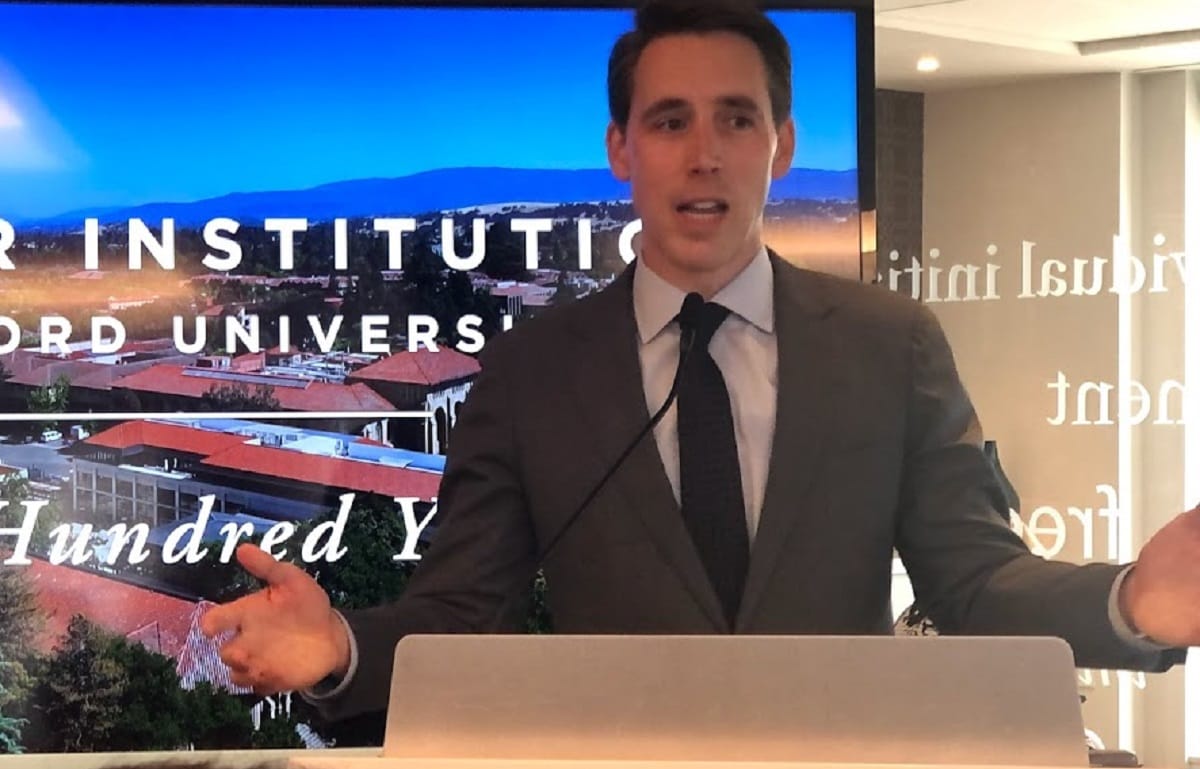Culture War Comes to Silicon Valley as Sen. Josh Hawley Introduces Bill to Strip Section 230 Immunity from Social Media
WASHINGTON, June 20, 2019 — Legislation authored by Sen. Joshua Hawley could signal the start of a new chapter of the culture war: Conservatives directly targeting Silicon Valley tech companies. On Wednesday, Hawley, R-Mo., announced that he’d introduced the “Ending Support for Internet Censorship A
Andrew Feinberg

WASHINGTON, June 20, 2019 — Legislation authored by Sen. Joshua Hawley could signal the start of a new chapter of the culture war: Conservatives directly targeting Silicon Valley tech companies.
On Wednesday, Hawley, R-Mo., announced that he’d introduced the “Ending Support for Internet Censorship Act” (PDF), which would repeal a provision of the 1996 Telecommunications Act that granted online service providers immunity from liability for user-generated content posted on their websites.
The law, known as Section 230 of the Communications Decency Act, has increasingly come to be seen as generous – and perhaps overly generous – in encouraging robust online discussion. Many of the law’s most public beneficiaries – Facebook, Google, Twitter – are now the technology platforms that are America’s largest companies.
As a result, a growing group of tech critics are saying that Section 230 is no longer in the national interest. (See our story last week, “With Google and Facebook Under Fire, Section 230 is at a Tipping Point as More Push for Changes.”)
Section 230 was included in the Telecom Act as a way of incentivizing websites concerned that they would be held liable for the comments of others. It was intended to reverse court rulings holding an online service provider liable for defamatory content posted by users when the tech company employed moderators to enforce terms of service rules.
Hawley’s mission against Facebook
Only six months into his first term, Hawley has garnered attention in conservative media circles by taking up the cause of conservative-identifying social media users. They claim that social media companies who ban or suspend the social networks’ rules against hate speech, threats, and harassment amounts to political censorship, even if done by a private sector actor.
(See our story last month, “Sen. Josh Hawley Accuses Facebook of Addiction and Calls Social Media Worth-Less,” which also touched upon Sen. Hawley’s views about Section 230.)
Now, Hawley says he wants condition providers’ immunity on their ability to convince four of five members of the Federal Trade Commission that they have not discriminated against conservatives when applying their terms of service.
The bill would only apply to platforms with more than 30 million active monthly users in the U.S., more than 300 million active monthly users worldwide, or more than $500 million in global annual revenue.
It would require these giant tech platforms to biannually provide the FTC with “clear and convincing evidence” that “their algorithms and content-removal practices are politically neutral.”
“With Section 230, tech companies get a sweetheart deal that no other industry enjoys: complete exemption from traditional publisher liability in exchange for providing a forum free of political censorship,” Hawley said in a statement.
“This legislation simply states that if the tech giants want to keep their government-granted immunity, they must bring transparency and accountability to their editorial processes and prove that they don’t discriminate.”
Tech industry lobbyists wonder whether they should take it seriously
But industry and legal experts savaged Hawley’s proposal as antithetical to the First Amendment and a throwback to policies long rejected by conservatives, including the Fairness Doctrine that required broadcasters using the nation’s radiofrequency spectrum to grant airtime to opposing views.
Computer & Communications Industry Association President Ed Black deplored the “ludicrousness” of Hawley’s proposal, which he called “an unbelievable disregard for the essence of the First Amendment and attempt to overlay a lens of partisan politics over the communications of millions of Americans.”
“If Congress is serious about tech companies doing more to remove hate speech and illegal content online, putting new restrictions on the legal protection that allows them to do that would be ill-advised,” Black said.
In a statement, TechFreedom President Berin Szoka said that the measure would effectively require internet companies to obtain a license from the FTC in order to operate. It would make them depend on the goodwill of FTC commissioners and the presidents who nominate them.
Szoka, who testified last year at a House Judiciary Committee hearing on conservatives’ allegations of political censorship, predicted that the biannual vote Hawley’s bill requires would turn into a “partisan bloodmatch” in which companies would be presumed guilty and have to prove their innocence.
“The bill would give politicians a gigantic regulatory hammer to use against big tech and transform the FTC overnight into the most politicized regulatory body in Washington,” he said. “Sadly, that seems to be the point.”
Szoka noted that Hawley’s bill would deter companies from making social networks “usable for normal people” by moderating content and combatting abusive behavior, extreme content and disinformation, and suggested such deterrence is meant to benefit Republicans.
“If, as social science research suggests, such harmful content seems to help Republicans energize their base more than it helps Democrats, even truly ‘neutral’ enforcement of terms of service will, on net, hurt the Right,” he said. “That which would explain why Republicans insist on framing content moderation as ‘censorship’ of their views.”
(Photo of Hawley by Drew Clark; Reporter Emily McPhie contributed to this article.)









Member discussion